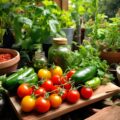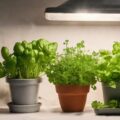The Joy of Fast-Growing Flowers
For those of us with a passion for gardening but limited patience, fast-growing flowers are a gift from nature. They offer the perfect blend of quick gratification and natural beauty, allowing us to transform our outdoor spaces in record time. Whether you’re a novice gardener eager to see results or an experienced green thumb looking to fill gaps in your garden quickly, these speedy bloomers are sure to bring a smile to your face and color to your world.
In this article, we’ll explore some of the quickest sprouting flower seeds that can turn your garden from bare to beautiful in no time. We’ll also delve into the joy and benefits of gardening, offering tips to nurture both your plants and your well-being along the way.
Top 5 Fast-Growing Flowers for Instant Garden Gratification
Let’s dive into some of the speediest flowers you can grow from seed:
- Sunflowers: These cheerful giants can sprout in as little as 5-10 days and reach impressive heights within weeks.
- Marigolds: Bright and hardy, marigolds can germinate in just 4-14 days, bringing vibrant colors to your garden.
- Zinnias: These multi-colored beauties can sprout in 4-7 days and bloom within 8-10 weeks of planting.
- Nasturtiums: With their edible flowers and leaves, nasturtiums can germinate in 7-10 days and bloom within 35-52 days.
- Sweet Alyssum: These tiny, fragrant flowers can sprout in 3-5 days and start blooming in just 6-8 weeks.
The Therapeutic Benefits of Gardening
While the quick results of fast-growing flowers are certainly satisfying, the act of gardening itself offers numerous benefits for our mental and physical well-being:
- Stress reduction: Tending to plants can lower cortisol levels, helping us feel more relaxed and centered.
- Improved mood: The combination of fresh air, physical activity, and connection with nature can boost our mood and overall sense of well-being.
- Increased mindfulness: Gardening encourages us to be present in the moment, fostering a sense of peace and contentment.
- Physical exercise: From digging to weeding, gardening provides a gentle form of exercise that can improve strength and flexibility.
- Sense of accomplishment: Watching your seeds sprout and grow into beautiful flowers provides a tangible sense of achievement and pride.
Nurturing Your Garden and Your Soul
As you tend to your fast-growing flowers, remember that gardening is not just about the end result but also about the journey. Here are some tips to help you cultivate both your garden and your inner peace:
- Practice patience: Even with quick-sprouting seeds, growth takes time. Use this as an opportunity to cultivate patience and appreciation for the natural rhythms of life.
- Embrace imperfection: Not every seed will sprout, and not every plant will thrive. Accept these natural variations as part of the gardening process.
- Connect with nature: Take time to observe the small miracles happening in your garden – a new leaf unfurling, a bee visiting a flower. These moments of connection can be deeply nourishing for the soul.
- Share the joy: Involve friends or family in your gardening adventures, or share your blooms with neighbors. Spreading beauty and joy can amplify your own happiness.
- Practice gratitude: Express thankfulness for the seeds that sprout, the rain that waters, and the sun that nourishes. Gratitude can transform your gardening experience and your outlook on life.
Creating a Compassionate Garden Space
As you plan and plant your quick-growing flower garden, consider creating a space that not only brings you joy but also supports local wildlife and promotes environmental sustainability:
- Choose native species when possible to support local ecosystems
- Include pollinator-friendly flowers to help bees and butterflies thrive
- Use organic gardening methods to protect the health of your plants and the environment
- Create a small seating area where you can sit and enjoy your garden, fostering moments of peace and reflection
- Consider adding a water feature to attract birds and create a soothing atmosphere
Remember, your garden is not just a collection of plants, but a living ecosystem and a reflection of your care and compassion.
FAQ: Quick-Growing Flowers and Joyful Gardening
Q1: How often should I water my fast-growing flowers?
A1: Most fast-growing flowers prefer consistently moist soil, especially when they’re young. Water deeply when the top inch of soil feels dry, typically every 2-3 days depending on your climate. However, be careful not to overwater, as this can lead to root rot.
Q2: Can I grow these quick-sprouting flowers in containers?
A2: Absolutely! Many fast-growing flowers, such as marigolds, zinnias, and sweet alyssum, do well in containers. Ensure your pots have good drainage and use a high-quality potting mix for best results.
Q3: How can I extend the blooming period of my fast-growing flowers?
A3: Regular deadheading (removing spent blooms) can encourage many flowers to produce more blossoms. Additionally, planting in stages every 2-3 weeks can provide a continuous display of blooms throughout the season.
Q4: Are there any fast-growing flowers that are edible?
A4: Yes! Nasturtiums are a great example of fast-growing edible flowers. Both their leaves and blossoms are edible, with a peppery flavor. Sunflower seeds are also edible once the flowers have matured.
Q5: How can I use gardening to improve my mental health?
A5: Gardening can be a wonderful tool for mental health. Try incorporating mindfulness practices while gardening, such as focusing on the sensations of soil in your hands or the scent of flowers. Set aside time each day to simply sit and enjoy your garden. You can also keep a gardening journal to track your plants’ progress and your own thoughts and feelings, fostering self-reflection and gratitude.
In conclusion, fast-growing flowers offer a wonderful way to quickly bring beauty and joy to your outdoor space. But remember, the true magic of gardening lies not just in the speed of growth or the beauty of the blooms, but in the process itself. As you nurture your quick-sprouting flowers, take time to nurture yourself as well. Let your garden be a space of growth, both for your plants and for your own well-being. Happy gardening!









